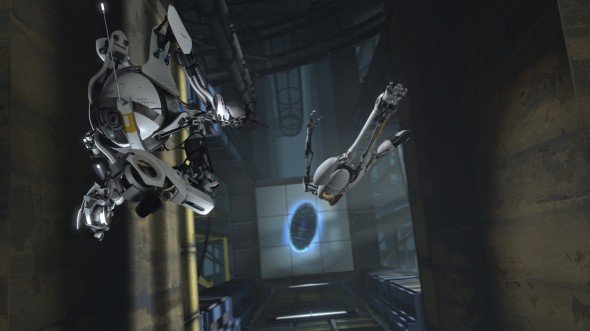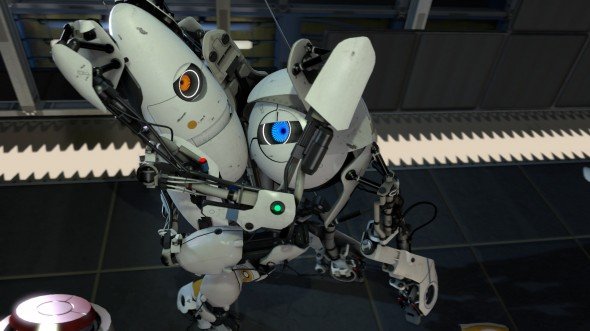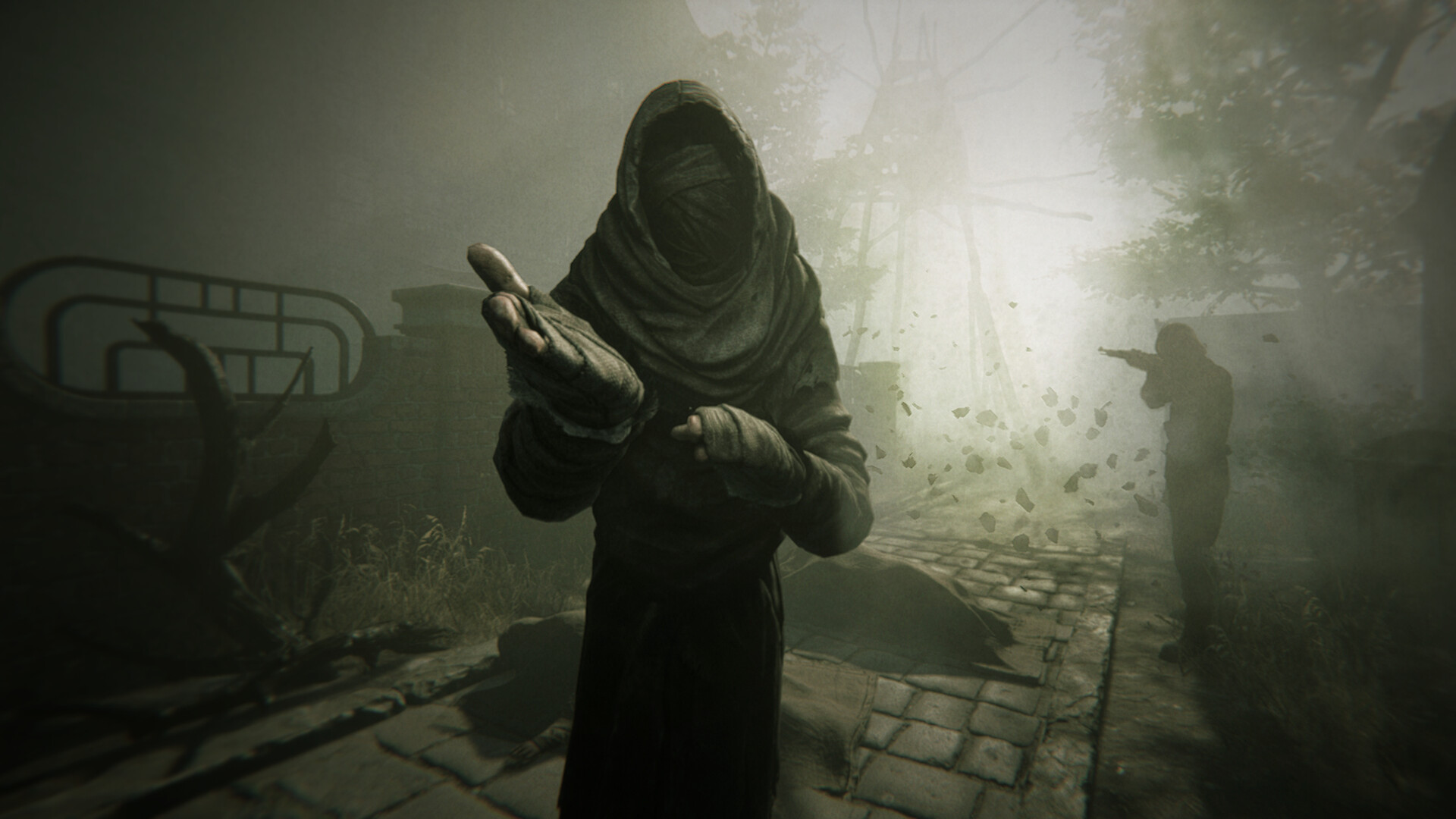Interview: Valve on their insane Portal 2 ideas
PC Gamer: So does GLaDOS say the same things to both of you?
Erik Wolpaw: Yeah. We actually toyed, at one point, with having GLaDOS saying one thing to one player but she's whispering another thing to the other player. But that wasn't working for various reasons, plus it would have required twice as much content - because we also needed a complete story that didn't have that, for when you were playing split screen. It was kind of fun for a little bit but for the effort it would take to replicate a completely different story without that... the joke wasn't so good that it was worth doing that.
The other idea was supposed to be, in this one section, that GLaDOS is trying to drive a wedge between you. And because she's GLaDOS, we figured people would be on board with that, clearly knowing that you were actually supposed to bind together. But people didn't actually really like being– anything that smacked of competition, we got negative feedback about.
She was doing this thing where she would start randomly assigning points for doing nothing, basically. But people would try to figure that out and they would be like “I want these points!” And they were meaningless. She was just arbitrarily assigning points. Sometimes they weren't even points, she'd give you, like, four pineapples or something. It didn't make any difference they were just some code of her own.
For most people it just wasn't working. It sounded great in theory, it's still a good joke when you say it, but in the actual playing of it it was falling a little bit flat. It was a) confusing people, and then b) making them angry.
Josh Weier: And there was this weird social thing that people would do that was kind of cool, where one person would go through the door and get some points, and the next time around, before they went through the door they'd say “No no, you go first”. So they were actually trying to game that and help each other out. So that was kinda cool, but, yeah, drove people the wrong way.
PC Gamer: Yeah, points are never meaningless.
Keep up to date with the most important stories and the best deals, as picked by the PC Gamer team.
Erik Wolpaw: Yeah, that's what we found out! Points are never meaningless.
Josh Weier: We did some mean things, too, where you would do the same things and she would award one player more points than the other, and that drove people nuts.
Erik Wolpaw: Yeah, exactly the same action would result in differing amounts of points.
PC Gamer: But you've still got some references to that in there, right? I mean we heard it.
Erik Wolpaw: Yeah, and we may actually end up shipping with a little taste of that. I was like, “I'm going to extend this [joke] out for six hours, and it's going to kill for six straight hours!” and it didn't. But maybe for six minutes it'll kill. For one chamber, we'll probably get the gist of that out there.
Josh Weier: The great thing is that we always go through tons of play testing so we tweak it, so we put it in there and see if it works. If it doesn't fly we don't need to do it.

PC Gamer: I've heard something to the effect that Portal pretty much done a year before shipping, and that year was spent play testing. Are you going to be able to give it that much testing this time round?
Josh Weier: Yeah, I think kind of from the core of it we've started with that approach. We would work on the tractor beam or whatever it was, the excursion funnels as we call them online, and it was just a matter of sitting down, seeing how people played it, making puzzles, figuring out the next puzzle. And they just go through, I mean, it must be hundreds of tests by the time they're done with it.
So clearly, we need to definitely put that same love through all of it. Weekly we'll run it through and have the whole game played by people, we'll bring in total Portal newbies, we'll bring in Portal pros and we'll bring in everyone in between, just trying to make sure that everybody can have fun and get through.
Erik Wolpaw: We had one our accountants or somebody on Friday who'd never played Portal and who doesn't really play games, and she floundered a little bit. But they actually were able to take some concrete changes to the levels that'll hopefully help anybody else, so yeah, the play test goes on.
It was mostly done, but some stuff in Portal 1, the final boss battle was in flux right up until near the end. We kind of had our fingers crossed in Portal 1, because the final puzzle in Portal isn't really even a puzzle, it's not very difficult, the GLaDOS boss battle. It's not an especially difficult puzzle, and before we had all of the bells and whistles in there, the final audio, it was sort of failing and failing and failing. And people said “well that was anticlimactic.” But we just knew - well we didn't know - we were hoping that if we layered enough crap on it, it would all of a sudden be more of a spectacle and people would enjoy it. But we would have been in trouble if the layering of different things hadn't turned out to be entertaining.
PC Gamer: So your approach is like, “Ah, this boss is fundamentally uninteresting so we'll just layer some crap on it and it'll be okay!”
Erik Wolpaw: Yeah! Well, it wasn't completely random, we were going from the mindset that nobody's going to want to solve a difficult puzzle while they're also being bombarded with a lot of visual stimulus and stuff to listen to. But a difficult puzzle without all this adornment isn't going to feel climactic, which we had proven that earlier by having a bunch of difficult puzzles, and people were reacting negatively to those.
And so the idea was "Here's a puzzle, we know it more or less works but people aren't finding it to be a worthy conclusion, but we know - again, hope/know - that if we put enough funny stuff in it, when there's some spectacle there that will cause it to succeed. And it did."
PC Gamer: I felt like the whole thing was building up to her breaking down. I held off putting the modules in the furnace until GLaDOS had said everything she was going to say for each one.
Erik Wolpaw: That was the one point where we kind of put some time pressure on you, in the most ham fisted way possible, we just literally had a timer counting down because that helped it be climactic. The time pressure I liked in Portal 1 was when you were riding the elevator thing into the fire, because it was time pressure but it was easily understandable time pressure. All of those lessons are folded into here. It's a little bit easier along at least some axis in Portal 2, because the team understands portals more, you can take a body of knowledge of what worked and what didn't in Portal 1 and move it forward for Portal 2.
PC Gamer: When you were starting Portal 2, were you playing around with anything fundamentally completely different?
Erik Wolpaw: Yeah, we did go down a couple of paths with some mechanics that we actually won't talk about because we might use them at some point. But one of the ideas was: what if the Portal franchise is, instead of always being about Portals – which'd be tough because it's called Portal – but what if it was always about introducing a new puzzle element that you're going through? it's about Aperture Science, and now you're going through this new testing track with this new element.
We pretty quickly found that, even though we had a couple of pretty interesting mechanics, that people would always, to a person, every play tester we had would say, “Yeah this is alright, but where's my portal gun?”
So then we went down the path of, “Well okay, what are all the things we thought of during Portal 1, and what are new things, what are new puzzle elements that combinatorially will create this much larger puzzle space?” As much as we may have been sick of portals, we found that play testers were not. They wanted more portals, and all the new puzzle elements did make it more interesting all of a sudden, between the paint stuff...
Also paint was one of the things we had played with as being “Okay this is the central mechanic: the goo.” That was one of the ones that we tried that we were actually able to fold into, and they actually played pretty well with, portals. We also went down a couple of branches where we'd take the central mechanics that we thought we were going to use as the fundamental component and try and mix it with portals. And for a lot of reasons, different mechanics - either they're just redundant, or they just ruin each other. There was all sorts of other stuff. We also didn't want it to be a game where I have a portal gun for half the game, and then this other thing for half the game.
Josh Weier: Plus I think Portal had this real elegance, where it was just: "I have my portal gun, and everything is dripping from that," And we didn't want to lose that, right? We felt that was important, players understood it and we wanted to find ways to make you and your portals more powerful, but in ways that were really obvious to people.
PC Gamer: So at one point you had the paint as being the central thing?
Erik Wolpaw: I think briefly we tried it. We tried everything. I think we had the Gravity Gun as the central thing at one point.
PC Gamer: The paint thing came from Tag: The Power of Paint , right? (A prototype by DigiPen students, just as Portal's precursor Narbacular Drop once was.)
Erik Wolpaw: Yeah, Tag, those guys, we hired them, they're all sitting in the room now. They had been off doing their own thing, working on some stuff, and then they worked on how to combine portals, and they came back to us with some maps and- "Wow, this really works."
Josh Weier: And it was a funny thing, too, because those guys were inspired by the first DigiPen students who made Portal, so they were inspired by Portal and were able to inspire us.
PC Gamer: I bet some people are working really hard at DigiPen right now.
Erik Wolpaw: It's tough to think up a new central puzzle mechanic.

PC Gamer: You guys have shown off the bouncy paint and the speed paint. In Tag, for me, the really interesting bit was when you got the sticky paint. (It allowed you to walk on painted walls and ceilings). Is that going to be in Portal 2?
Erik Wolpaw: It's up in the air at this point. Can we talk about that?
Josh Weier: We'll leave some surprises for down the road. Like everything, we test it all, we see what works and what doesn't. We're still in the process of poking a couple of things to see what we can do with paint, and some other stuff that people haven't seen in Tag that makes it all the more fun.
PC Gamer: But there are more kinds of paint than we've seen, right?
Erik Wolpaw: Yes. Sticky paint's a... we're working on it. We're working on sticky paint.
PC Gamer: This is something my friend Tom said, but we think it's a huge missed opportunity that they're called Propulsion Gel and Repulsion Gel, when they could be called Propulsion Emulsion and Repulsion Emulsion.
Erik Wolpaw: They may still be, by the time it ships, because of that. Propulsion Gel… Emulsion. Emulsion is a good word. Right. Maybe we'll take that. It's not set in stone yet.
PC Gamer: And the sticky one could be Compulsion Emulsion.
Erik Wolpaw: Oh yeah! The unknown paint may be harder to fit into that naming structure.
PC Gamer: Something a bunch of people have commented on, from seeing the videos, is that they're scared it'll be too hard for them.
Erik Wolpaw: So, it won't be. This may be more the fault of the trailer. It's hard to get someone pumped up by someone slowly and deliberately solving a puzzle. There's a panic that sets in that we're going to have to show this in an auditorium full of people, and they're not going to want to watch somebody solve a puzzle.
So the way we thought about it when we were putting it together: in the very original Portal trailer there was this sort of 2D graphic that showed it going crazy, and we thought, "Let's just show it going crazy in the game, but in-game." And it was a hard thing to split the difference.
But rest assured, absolutely, the number one goal is to have a gradual training arc, and also to ensure that things aren't too execution heavy. The person we had doing it was doing it in the flashiest way humanly possible.
PC Gamer: Was it Jeep [Barnett, Portal 1 designer and portal ninja] by any chance?
Josh Weier: I think Jeep helped us in a couple of them. We've got some other portal ninjas, too.
Erik Wolpaw: It took a lot of takes, everybody was just sitting around that night, just, you know, "Who can do the one that looks really good?" It was a long night of recording.
Josh Weier: But again, our play test process is what helped us to get through that stuff, right? Like, we put all sorts of people through just to make sure that we're not excluding anybody who could have fun with the game, because it is such a broad reaching game. It's not the typical sort of game where, you know, your girlfriend or wife or kids might look at it and go, “Ah, I don't know.” We really want to appeal to those people too, and it's the kind of game where you can do that.
My play time with Portal 2's co-op mode has convinced me it's the way a Portal game should be played. Solving the puzzles feels like planning a heist: assigning duties, calculating timing, then blundering into action and restrategising as you go. When it goes wrong, it's hilarious. And when it goes right, it's sublime.
Tomorrow I'll be talking to Gabe Newell and co about their plans to expand their games into other mediums, and handle it all themselves: including the Half-Life movie, if people want it. The trailer above is the first time we've really seen their burgeoning movie-making talents applied to Portal, and it probably won't be the last.

